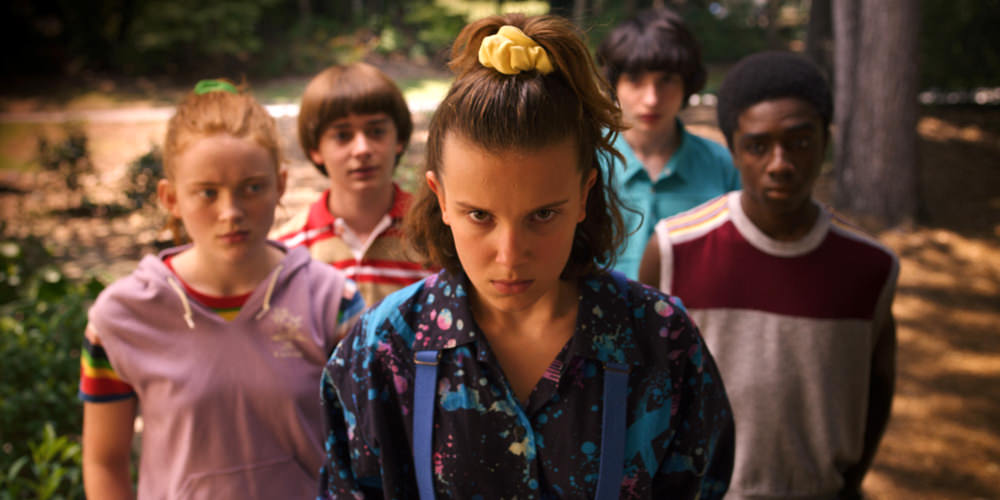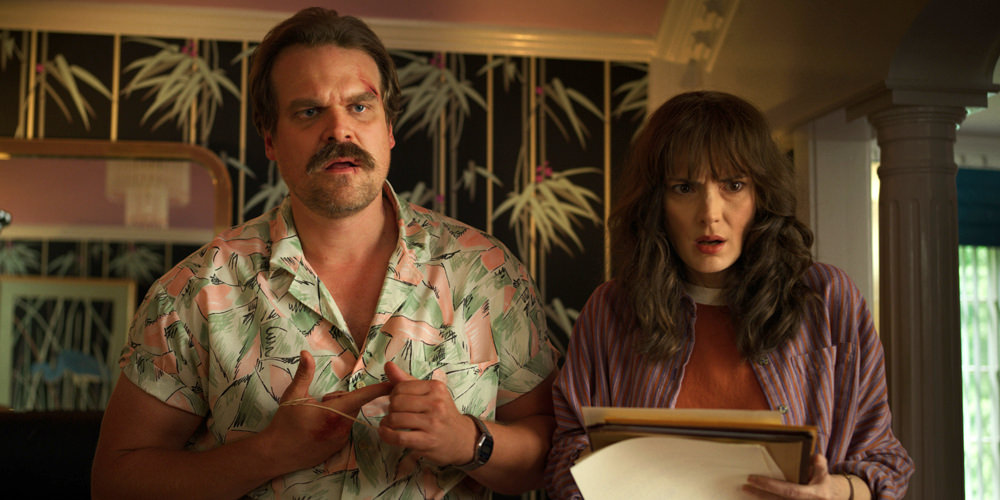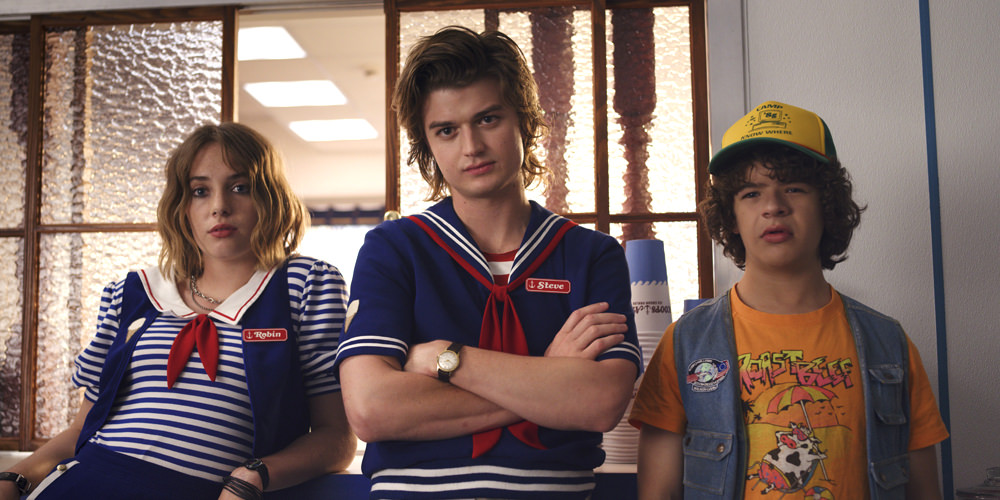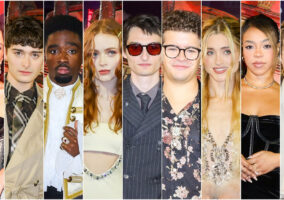
We’ve told this story before, so we apologize ahead of time for boring you early in this review, but we promise there’s a point. A fairly obvious one, in fact. In 1960, Tom’s mom was a good Catholic girl named Peggy who lived in Queens, had just completed secretarial school, and found herself working for a big corporation in a glamorous Manhattan skyscraper. For rather stunningly obvious reasons, Tom couldn’t wait to hear her thoughts on Mad Men when it really hit the zeitgeist. She watched a few episodes. Pondered them. Called her old girlfriend (and Tom’s godmother), who worked with her in the same office back in the day and chatted with her about the show. When she finally got back to us with her thoughts they were disappointingly monosyllabic:
“Enh.”
She was flattered by it, vaguely amused by it, and had a few things to say about the show’s accuracy, which she didn’t hold in high regard (“No one wore their clothes so tight in the office!”), but ultimately, she just didn’t think it was a time and place that lent itself to interesting stories and she found the show to be pretty boring. Older Millennial and Gen-Xers couldn’t get enough of the styles, the cocktails and the retro vibe of the show, but for Tom’s mom and so many other people who had adult memories of the period, the intense appeal of a show like Mad Men seemed a little elusive and overblown.
Okay, so. Our point. It should be a skosh obvs by now. Our followup point: We’ve been pondering this all week; this idea of whether or not our somewhat salty take on Stranger Things, this beloved show, comes down to simply being people who were teenagers in the ’80s; the exact people being depicted. It’s a meticulously constructed homage to a decade many of the people involved in the show’s creation didn’t experience directly, and going by the fan and critical response, it has a rather large and intense support coming from folks who also don’t have a lot of direct experience with the Reagan years. But after turning this over and over again all week, we honestly don’t think that’s our problem with it.

Unlike Tom’s mom and the milieu of mid-Century Manhattan corporate melodrama, we think the basic idea of Stranger Things – and the main driver of its considerable charm as a piece of entertainment – sounds fun. Give us that homage to ’80s teen movies, action movies, and horror movies. Inject all that mall fashion and Aqua-Net’d hair directly into our veins. We’re completely up for a round of nostalgia and homage and we think Stranger Things is especially good at depicting its version of the decade. No, it’s not the familiarity of the setting or the overwhelming sense of pastiche that gets us antsy. We’ve stumbled across or into “Have you caught up on season 3 of Stranger Things” conversations all week and we kept asking one question over and over again; one that most people had a problem answering:
“Okay, but … what is Stranger Things about?”
And we don’t mean “the eighties” or “movie homages” or “being a kid.” In the end, Mad Men wasn’t really about the advertising industry or New York or the 1960s. It covered those things, of course – as well as the perspectives of middle class white people in the mid-Century, the sexism of decades past, alcoholism, infidelity, racism, classism, the allure of power, the shifting of social mores, and the tragedy of bad parenting. But Mad Men was “about” so much more than just depicting these things or exploring these themes, and it was definitely about more than paying homage to the images and media of the decade. When Mad Men pointed out that certain people looked like the idealized American advertising archetypes of the period, when it compared characters to Grace Kelly or Marilyn Monroe, when it explored the beloved archetype of the plucky, perky go-getter gal trying to make her way in the big city, Mad Men didn’t just lovingly remind you of these things. It said something about them. The Man in the Gray Flannel Suit was broken and twisted inside. The Marilyn analogue got raped. The perfect middle class mother was angry, nervous and neglected. The plucky go-getter wound up in the psych ward after she gave up her baby.

We absolutely are not suggesting that Stranger Things would be better if it put all its characters through those kinds of emotional wringers. The relative lightness of its storytelling (despite all the darkness) and the charm of its cast would not be well served by adding alcoholism and unwanted pregnancies to the mix. That’s not what the show is about. But there’s that obvious question again: What is it about, then? What is it saying about the eighties, about action or horror movies, about the Cold War, about malls and pop song references and New Coke and cotton candy fashion? Or is the entire point of Stranger Things to avoid having anything to say about the things it lovingly recreates or references? Is the loving recreation the entire reason for the show? Because after three seasons, it’s not enough.
Having put that out there, we reiterate that Stranger Things is extremely entertaining. The cast is almost uniformly charming (David Harbour wasn’t well-served by the scripts or direction this season, coming across much angrier and darker than anyone else in the cast, including the outright villains and demonically possessed), and that this season showed a real leap forward in the quality of the plotting and pacing. By the finale, a whole bunch of wildly divergent story strands got seamlessly woven together and the tension level had been exquisitely raised in the finest ’80s action movie traditions. It was fun. We were charmed. Those kids are great. We especially loved Maya Hawke’s introduction as Robin. Not only does she add another female voice to a show that was originally pretty heavily “Boy’s Adventure” in tone, but it’s a sardonic, funny, biting voice amongst a chorus of rather sweetly engaging ones. A little salt in the sugar bowl. And just as her chemistry with Joe Keery (the all-time charmer of the cast) reached insane levels, the show put exactly the kind of spin on this quintessentially ’80s teen character we’re talking about and begging to see more of. The Cool Chick making crazy banter with the Hair Dude? She’s totally gay.
More of that, please. Much, much more. Put a spin on these tropes. Say something about how limiting they were or what underlying truths they embodied. Stranger Things finished its third season having displayed a new sophistication and maturity in its storytelling. When it comes back for the next one, we’d sure love to see it show some depth and nuance to go along with all that fabulous fashion.
[Photo Credit: Netflix]
The “Judy” Trailer Has Dropped and it Didn’t Change Our Minds Next Post:
Awkwafina at “The Farewell’ NYC Screening
Please review our Community Guidelines before posting a comment. Thank you!



